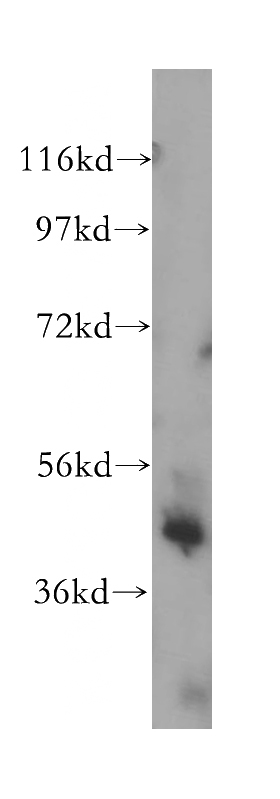-
Product Name
FECH antibody
- Documents
-
Description
FECH Rabbit Polyclonal antibody. Positive WB detected in human heart tissue, HeLa cells, human liver tissue, K-562 cells. Observed molecular weight by Western-blot: 46kd
-
Tested applications
ELISA, WB
-
Species reactivity
Human,Mouse,Rat; other species not tested.
-
Alternative names
EPP antibody; FCE antibody; FECH antibody; FerrOChelatase antibody; mitOChondrial antibody; Heme synthase antibody; Protoheme ferro lyase antibody
-
Isotype
Rabbit IgG
-
Preparation
This antibody was obtained by immunization of FECH recombinant protein (Accession Number: NM_000140). Purification method: Antigen affinity purified.
-
Clonality
Polyclonal
-
Formulation
PBS with 0.02% sodium azide and 50% glycerol pH 7.3.
-
Storage instructions
Store at -20℃. DO NOT ALIQUOT
-
Applications
Recommended Dilution:
WB: 1:500-1:5000
-
Validations

human heart tissue were subjected to SDS PAGE followed by western blot with Catalog No:110613(FECH antibody) at dilution of 1:500
-
Background
FECH(ferrochelatase, mitochondrial ) is also named as heme synthase, protoheme ferro-lyase and belongs to the ferrochelatase family. It is a homodimeric (86 kDa) mitochondrial membrane-associated enzyme that catalyzes the insertion of ferrous iron into protoporphyrin to form heme(PMID:11175906). It has 2 isoforms produced by alternative splicing and the full length protein has a transit peptide with 54 amino acids.
-
References
- Khechaduri A, Bayeva M, Chang HC, Ardehali H. Heme levels are increased in human failing hearts. Journal of the American College of Cardiology. 61(18):1884-93. 2013.
- Qiao A, Khechaduri A, Kannan Mutharasan R, Wu R, Nagpal V, Ardehali H. MicroRNA-210 decreases heme levels by targeting ferrochelatase in cardiomyocytes. Journal of the American Heart Association. 2(2):e000121. 2013.
Related Products / Services
Please note: All products are "FOR RESEARCH USE ONLY AND ARE NOT INTENDED FOR DIAGNOSTIC OR THERAPEUTIC USE"
